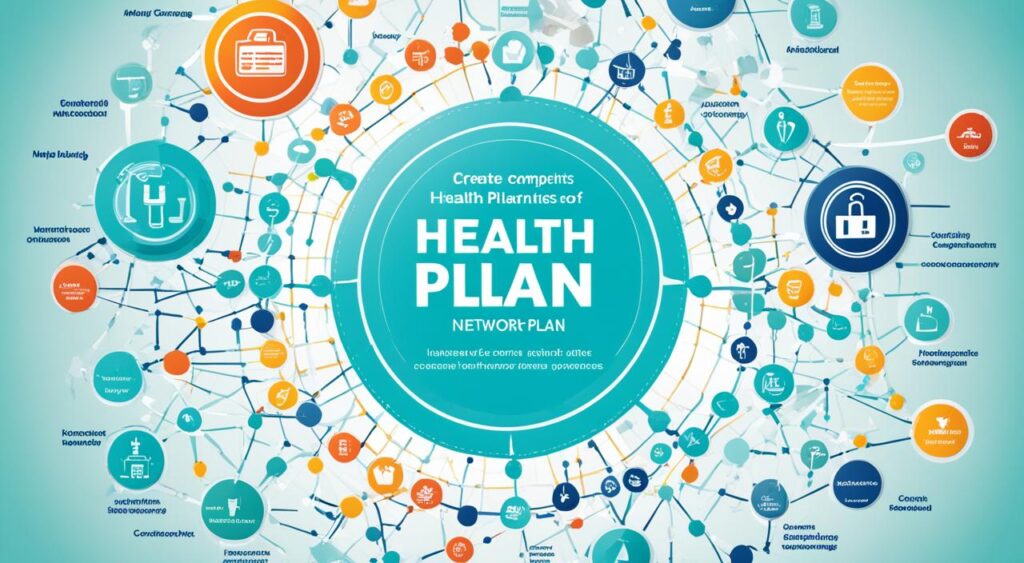A health insurance policy is a deal between someone or their family and an insurance company. It helps protect against the big costs of health care. By paying a premium every month, people get to use a lot of healthcare services. They also get help with bills they weren’t expecting. Thanks to the Affordable Care Act, more people can now get good health insurance plans. This is possible through the Health Insurance Marketplace. It means affordable health insurance is within reach for many.
This agreement spells out exactly what health help and perks the person gets from their insurance company. It talks about what’s covered, the cost the person pays themselves (like deductibles, copayments, and coinsurance), and which doctors are in the plan’s list. Knowing what you can get from your health insurance and what it will cost you is key. It helps when you’re picking a health plan that fits your family or personal needs.
Key Takeaways
- A health insurance policy is a contract that provides financial protection against high medical costs.
- Health insurance covers a range of healthcare services, including doctor visits, hospitalization, and prescription drugs.
- The Affordable Care Act has expanded access to comprehensive health insurance plans through the Health Insurance Marketplace.
- Understanding the coverage options and benefits included in a health insurance policy is crucial when shopping for the right plan.
- Health insurance policies outline the policyholder’s out-of-pocket costs, such as deductibles, copayments, and coinsurance.
Understanding Health Insurance Policies
Health insurance is there to lessen the financial blow of healthcare costs. It allows many people to team up and share the risk of medical expenses. This way, folks can get the care they need without massive bills.
Purpose of Health Insurance
Health insurance’s goal is simple: protect families from sudden, high medical bills. It spreads the cost out among lots of people. This makes it easier for everyone to afford checkups, vital treatments, and emergency care.
Types of Health Insurance Plans
Different health insurance plans are out there, like ones for individuals, families, or through work. You might find high-deductible plans or managed care systems like HMOs and PPOs. It’s crucial to pick a plan that fits your healthcare needs and budget.
Essential Health Benefits Covered
Health insurance must cover a wide array of essential health benefits thanks to the Affordable Care Act. These benefits ensure everyone can get the healthcare they need. From simple check-ups to specialized treatments, everyone is included. The services span preventive care to specific needs. The list of benefits is long. Some include:
Ambulatory Patient Services
This is care received without being admitted to a hospital. It includes visits to the doctor’s office, surgeries not needing overnight stays, and some home-based care.
Emergency Services
If there’s a life-threatening incident, the costs of emergency care are covered. This includes emergency room visits, ambulance rides, and the immediate care needed to prevent serious harm or death.
Hospitalization
Inpatient services are covered, which means costs for surgery and hospital stays are included in these benefits packages.
Mental Health and Substance Abuse Services
Diagnosis and treatments for mental health issues are part of these plans. They also cover services for those dealing with substance abuse, like counseling and rehab.
Pediatric Services
Children get their own set of benefits. These include check-ups, vaccines, dental and eye care, and other pediatric-specialized services.
Pregnancy, Maternity, and Newborn Care
The various aspects of family planning and care during pregnancy are covered. This includes care before and after birth, any hospital stays, and handling any complications.
Prescription Drugs
Medications, both brand-name and generic, are included. This also covers specialized drugs needed for severe or ongoing health problems.
Preventive and Wellness Services
Regular check-ups and screenings are part of these benefits. They also include advice for staying healthy and avoiding diseases.
Laboratory Services
Diagnostic tests, like blood work and imaging, are covered. These are needed to monitor and diagnose health issues.
Rehabilitative and Habilitative Services
Services to improve or regain physical, occupational, or speech abilities are covered. This includes therapies to help with injuries, illnesses, or disabilities.
Also Read: What Skills Are Needed For An Insurance Adjuster Position?
Preventive Services Covered

Health insurance must include many preventive services without charging the policyholder. These services help adults, women, and children. They aim to find health problems early, prevent diseases, and keep you healthy.
Preventive Services for All Adults
For adults, health insurance offers checkups, tests, advice, and shots for free. This care finds issues early, keeps chronic diseases in check, and stops some diseases. You might get things like a yearly checkup, tests for colon cancer, checks your blood pressure, and flu shots at no charge.
Preventive Services for Women
Women get special preventive services under their health plans. This includes visits to the OB/GYN, birth control help, advice for breastfeeding, and tests for things like cervical and breast cancer. Health plans make sure women get the care they need at every life stage.
Preventive Services for Children
Kids have their own preventive services too. They get checkups, tests to watch their growth, shots, and checks for things like their eyes, ears, and lead in the blood. This early care supports their health as they grow.
Health insurance includes many types of preventive care at no extra cost. This care is key for staying well and avoiding big health problems later. It’s a vital part of insurance that benefits people of all ages.
Health Insurance Policy Coverage

Health insurance policies help cover many healthcare services. They make sure people can get medical care they need without huge costs. The main areas they cover are:
Hospital and Doctor Visits
These plans pay for hospital stays and outpatient procedures. They also include visits to doctors. You might get help with room costs, surgery fees, and tests, among other things. But, how much they pay can change based on your plan, like deductibles or copayments.
Prescription Drug Coverage
Health policies usually cover the cost of prescription drugs. For many, this is a big cost. Plans may have a list of meds they cover and rules for how much you need to pay, like with deductibles or copayments. It’s important to check the drug coverage when you pick a plan.
Pre-Existing Conditions
The Affordable Care Act (ACA) stops insurance companies from saying no or charging more because of past health issues. This helps people with conditions like chronic illness or disabilities. They can get health insurance and the care they need without worrying about costs or being turned away.
Understanding Health Plan Networks

When picking a health insurance policy, look into the provider network it offers. Health insurance companies team up with doctors, hospitals, and other providers to give services at lower rates. This network setup helps keep healthcare costs in check.
In-Network Providers
In-network providers agree to the insurance company’s rates for services they offer. Choosing these providers means you’ll pay less money upfront. This is because your insurance will help with more of the costs. With in-network care, you often pay lower deductibles and copays.
Out-of-Network Providers
Out-of-network providers haven’t made such an agreement. If you see them, you might pay more from your own pocket. Your insurance will cover less of these costs. Plus, these providers might not meet the same standards as in-network ones.
When looking for health insurance, understanding the network is key. Be sure your favorite doctors and hospitals are in-network. This can save you a lot on medical bills.
Cost-Sharing Components

Getting health insurance means knowing the key parts of the policy. You’ll learn what you and the insurance company will pay for. The essential parts are deductibles, copays, and coinsurance in a health insurance policy.
Deductibles are what you pay first before your insurance helps. They can be from a little to a lot, depending on your health plan. After footing your deductible, the insurance often chips in for most costs with coinsurance.
Copayments are fixed costs for certain services, like seeing a doctor or getting medicine. You have to pay these, regardless of your deductible status. Copays differ based on what you’re paying for and your insurance company.
With coinsurance, you pay a percentage after your deductible is covered. Say it’s 20% – you pay that and the insurer pays the other 80%. These rates also change with different health plans and services.
It’s key to know these parts when getting health insurance. This knowledge helps in picking the best coverage options for you or your family. Checking the plan’s details on deductibles, copays, and coinsurance is crucial. This way, you make a smart choice, getting the right health coverage for your health needs.
Enrollment Periods and Qualifying Events
When you’re looking at health insurance policies, it’s key to know about enrollment times and special events. The Affordable Care Act set these up. During the open enrollment period, you can pick a health insurance plan. This is the best time for most people to do so.
If it’s not open enrollment, you can still sign up or make changes if a big life event happens. For example, if you lose your health coverage, get married, or have a child, that’s a qualifying event. It kicks off a special time period when you can get or tweak your health plan.
Knowing when you can enroll or make changes is crucial for health insurance users. It’s good to learn about these things online. The healthcare.gov website and the California Department of Insurance offer great info. This helps individuals and families expertly work through health insurance choices.
FAQs
Q: What is a health insurance policy and what does it cover?
A: A health insurance policy is a contract between an individual and an insurance company that helps cover the costs of medical expenses. Depending on the specific plan, it may cover doctor’s visits, hospital stays, prescription medications, preventive care, and more.
Q: What types of health coverage are available?
A: There are various types of health coverage available, including individual health insurance plans, group health insurance plans, marketplace plans, and government-sponsored plans like Medicaid and Medicare.
Q: How can I compare different health insurance plans?
A: You can compare health insurance plans by looking at factors such as premiums, out-of-pocket costs, network of healthcare providers, coverage options, and benefits offered by each plan.
Q: What is the Affordable Care Act and how does it impact health insurance?
A: The Affordable Care Act, also known as Obamacare, is a healthcare reform law that aims to make healthcare more accessible and affordable for Americans. It has provisions that regulate health insurance companies, expand coverage options, and provide subsidies for those who qualify.
Q: What is a health maintenance organization (HMO) and how does it differ from other types of plans?
A: HMOs are a type of health insurance plan that typically requires members to choose a primary care physician and get referrals to see specialists. They usually have lower out-of-pocket costs but offer less flexibility in choosing healthcare providers compared to other types of plans like PPOs.
Q: What are the benefits of shopping for health insurance on the marketplace?
A: Shopping for health insurance on the marketplace allows individuals to compare plans from different insurance companies, access subsidies based on income, and enroll in comprehensive coverage that meets their needs.
Q: What does health insurance typically cover?
A: Health insurance typically covers a range of services such as preventive care, doctor’s visits, hospital stays, emergency care, prescription medications, mental health services, and maternity care. However, coverage can vary depending on the specific plan.




